 The coefficient pt of the fourth term with its sign changed is equal to the sum of the products of the roots taken three... The coefficient pt of the fourth term with its sign changed is equal to the sum of the products of the roots taken three...  A Higher Algebra - Page 418by George Albert Wentworth - 1891 - 521 pagesFull view A Higher Algebra - Page 418by George Albert Wentworth - 1891 - 521 pagesFull view - About this book
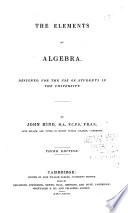 | John Hind - Algebra - 1837 - 584 pages
...whence, the equation a?2 - pas + q = 0, is manifestly equivalent to a?8 - (a + )8) a? + a/3 = 0 : where the coefficient of the second term, with its sign changed, is equal to the sum of the roots, and the third term is equal to their product. 144. Con. 3. Since a? — (a + ft) tv + a/3 = 0, is equivalent... | |
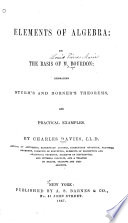 | Charles Davies - Algebra - 1857 - 408 pages
...sum of the different products of the roots, taken two in a set. 3d. The co-efficient of the fourth term, with its sign changed, is equal to the sum of the different products of the roots, taken three in a set, and so on. 4th. The absolute term, with its... | |
 | John Hymers - Algebra - 1858 - 310 pages
...another ; let therefore " - _ (í\3 . з з - _ . \3/ ' Hence y3, zs, are the roots of the equation since the coefficient of the second term with its sign changed is equal to their sum, and the last term is equal to their product. Solving this equation, we get / but x = y +... | |
 | Isaac Newton - Curves, Algebraic - 1860 - 177 pages
...curves thus, let ^—(aa: + b)yn~1 + (ca;* + da: + e)yn~*'-' &c. = o Then, since in every equation the coefficient of the second term with its sign changed is equal to the excess by which the sum of the positive exceeds the sum of the negative roots, where this term is deficient,... | |
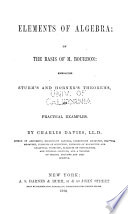 | Charles Davies - Algebra - 1860 - 412 pages
...relations, we derive the following conclusions with reference to the values of the co-efficients : 1st. The co-efficient of the second term, with its sign changed, is equal to the algebraic sum of the roots of the equation. 2d. The co-efficient of the third term is equal to the... | |
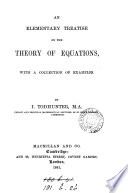 | Isaac Todhunter - Equations, Theory of - 1861 - 330 pages
...term is equal to the sum of the products of every two of the roots ; the coefficient of the fourth term with its sign changed is equal to the sum of the products of every three of the roots ; and so on. Thus generally if pr denote as usual the coefficient... | |
 | Thomas Kimber - Mathematics - 1865 - 302 pages
...and x — /3 = 0, (х - a) (,r - /8) = 0, Or я* — (a + /3) x + a ß = 0. Whence it appears that the coefficient of the second term, with its sign changed, is equal to the sum of the roots, and the third term is equal to their product. 183. Every equation of the form, x'm + p xm = q ; in... | |
 | Charles Davies - Algebra - 1871 - 404 pages
...relations, we derive the following conclusions with reference to the values of the co-efficients : 1st. The co-efficient of the second term, with its sign changed, is equal to the algebraic sum of the roots of the equation. 2d. The co-efficient of the third term is equal to the... | |
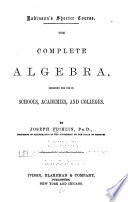 | Joseph Ficklin - Algebra - 1874 - 446 pages
...arranged according to the descending powers of x and that the coefficient of the first term is 1; then 1. The coefficient of the second term with its sign changed is equal lo the sum of the roots (592, 15, 1C) ; 2. The coefficient of the third term is equal to the sum of... | |
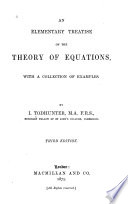 | Isaac Todhunter - Algebra - 1875 - 344 pages
...term is equal to the sum of the products of every two of the roots ; the coefficient of the fourth term with its sign changed is equal to the sum of the products of every three of the roots ; and so on. Thus generally if pr denote as usual the coefficient... | |
| |